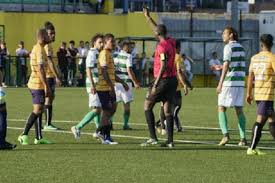By Andrew Warshaw
June 6 – It has taken a tournament for unaffiliated nations, stateless peoples, breakaway diasporas, indigenous communities and ethnic minorities to launch what is being hailed as one of football’s most refreshing innovations to cut down on dissent and improve respect for officials.
Next week’s World Cup in Russia may see the advent of Video Assistant Referees but of potentially just as great significance is the game’s first-ever green card – halfway between a red and a yellow – being used at the Conifa World Football Cup in London.
Under the system, which has not yet been considered by the game’s lawmakers, a player is sent off but his team can immediately throw on a substitute to get back to 11 a side.
Several games have already seen green cards brandished including Padania versus Tuvalo last weekend.
CONIFA guidelines for issuing green cards state that “a player who receives a green card must leave the field of play immediately, but can be replaced if his team have not used all of their substitutes. A player receiving a green card is not excluded from his team’s next match.”
Paul Watson, organiser of the CONIFA tournament, explained that the green card has been introduced to help combat the level of unsportsmanlike conduct which has become prevalent in the game.
“We’d really like to clamp down on the dissent problem. Football has a problem with the lack of respect for referees,” Watson told Sky. “That’s not to say that isn’t also the case in CONIFA games – the players in our tournament still have those traits. But it would be nice that, instead of it being ignored and therefore in a way condoned, it shouldn’t necessarily cost someone their chance to play at this tournament, if they just lose their cool.”
Mark Clattenburg, for 13 years a Premier League referee who took charge of the opening Conifa game and will officiate in Saturday’s grand final at Enfield in north London, is a big supporter of green cards, conceptualised as a fresh take on the Gaelic Athletic Association’s revoClalutionary black card.
So is Jens Jockel, CONIFA’s Asian region President. “It’s a really good idea of how to sanction things that might not be worthy of a red card,” he said. “More like personal mistakes – using swear words, disrespecting spectators and coaches and so on. It’s a perfect way to find something in between.”
On the pitch, Thursday’s semi-finals will pit northern Cyprus against tournament favourites Padania, based in northern Italy, and Karpatalya – a Hungarian diaspora from Ukraine who only entered as a late replacement but have been the surprise package – against Székely Land, an ethnic minority based in Romania’s eastern Transylvania.
But the tournament has not been without its troubles, throwing up precisely the kind of controversy organisers have been at such pains to prevent.
Ellan Vannin, from the Isle of Man, withdrew after Conifa (full name Confederation of Independent Football Associations) failed to uphold their complaint that opponents Barawa – officially hosts of the tournament – circumvented eligibility rules by drafting in a Libyan international after having already played their first match.
Ellan pulled out of a placement game against Tibet after their request to overturn the 2-0 defeat by Barawa, a crucial result which meant they agonisingly missed out on a place in the quarter-finals on goal difference, was rejected.
“The team, myself, everyone who has helped us on this journey over the last four years feel incredibly let down,” said Malcolm Blackburn of the Manx International Football Alliance. “We feel as small island that we are being discriminated against.”
Contact the writer of this story at moc.l1713486470labto1713486470ofdlr1713486470owedi1713486470sni@w1713486470ahsra1713486470w.wer1713486470dna1713486470

